苏教版七年级下册英语知识点
- 格式:wps
- 大小:30.50 KB
- 文档页数:4
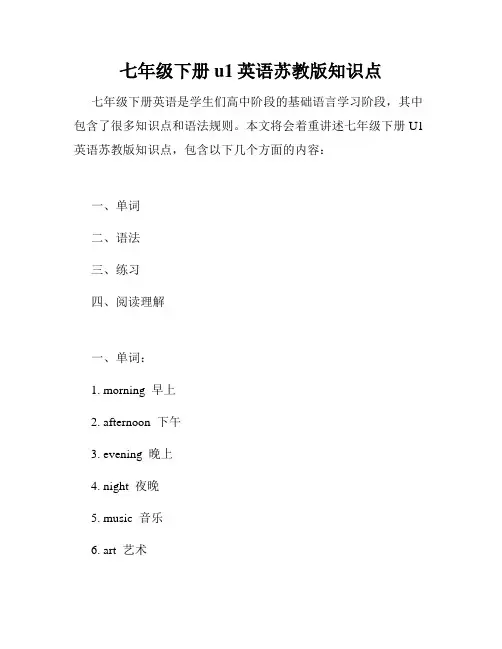
七年级下册u1英语苏教版知识点七年级下册英语是学生们高中阶段的基础语言学习阶段,其中包含了很多知识点和语法规则。
本文将会着重讲述七年级下册U1英语苏教版知识点,包含以下几个方面的内容:一、单词二、语法三、练习四、阅读理解一、单词:1. morning 早上2. afternoon 下午3. evening 晚上4. night 夜晚5. music 音乐6. art 艺术7. swimming 游泳8. basketball 篮球9. soccer 足球10. Russian 俄语11. Australia 澳大利亚12. pencil case 铅笔盒13. schoolbag 书包14. library 图书馆15. science museum 科技馆二、语法:1. be 动词:am, is, are2. 一般现在时:主语+谓语动词3. 情态动词:can, can’t, must4. 疑问词:what, where, when, who, why, how三、练习:1. 将以下句子变成肯定句:a. She isn’t tall.She is tall.b. I can’t swim.I can swim.c. They aren’t in Australia.They are in Australia.2. 将以下句子变成否定句:a. He is playing basketball.He isn’t playing basketball.b. We are in the library.We aren’t in the library.c. They can speak Russian.They can’t speak Russian.四、阅读理解:Mr. Black is a teacher. He works in a school. He gets up early in the morning. He has breakfast at 6:30. He goes to school at 7 o’clock. He teaches English. He has lunch at 12 o’clock. He goes home at 4:30 in the afternoon. He has dinner with his family at 6. He watches TV after dinner. He goes to bed at 10 o’clock.根据以上短文,选择正确答案:1. What does Mr. Black do?A. He’s a doctor.B. He’s a teacher.C. He’s a lawyer.2. What time does Mr. Black get up?A. At 6:00.B. At 6:15.C. Early in the morning.3. What subject does Mr. Black teach?A. Chinese.B. English.C. Math.4. When does Mr. Black go home?A. At 12:00 in the afternoon.B. At 4:30 in the afternoon.C. At 6:30 in the evening.5. When does Mr. Black go to bed?A. At 8:00.B. At 10:00.C. At 12:00.以上就是本文所涵盖的七年级下册U1英语苏教版知识点内容,希望对学生们的英语学习有所帮助。
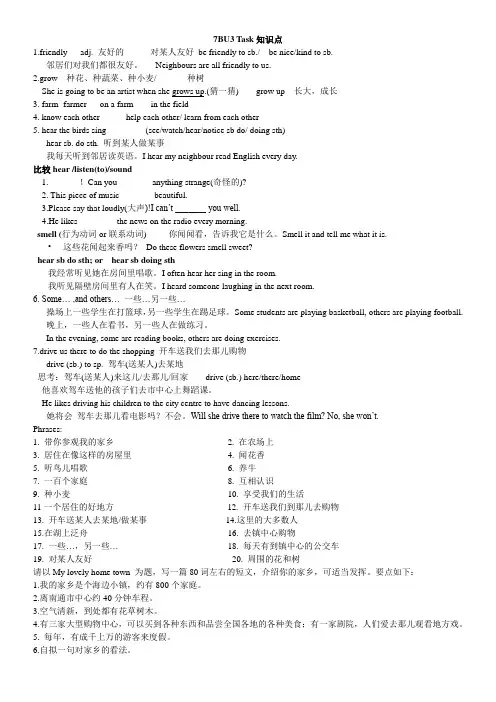
7BU3 Task知识点1.friendly adj. 友好的对某人友好be friendly to sb./ be nice/kind to sb.邻居们对我们都很友好。
Neighbours are all friendly to us.2.grow 种花、种蔬菜、种小麦/ 种树She is going to be an artist when she grows up.(猜一猜) grow up 长大,成长3. farm- farmer on a farm in the field4. know each other help each other/ learn from each other5. hear the birds sing (see/watch/hear/notice sb do/ doing sth)hear sb. do sth. 听到某人做某事我每天听到邻居读英语。
I hear my neighbour read English every day.比较hear /listen(to)/sound1.______ !Can you _______ anything strange(奇怪的)?2. This piece of music _______ beautiful.3.Please say that loudly(大声)!I can’t _______ you well.4.He likes ________ the news on the radio every morning.smell (行为动词or联系动词) 你闻闻看,告诉我它是什么。
Smell it and tell me what it is.•这些花闻起来香吗?Do these flowers smell sweet?hear sb do sth; or hear sb doing sth我经常听见她在房间里唱歌。
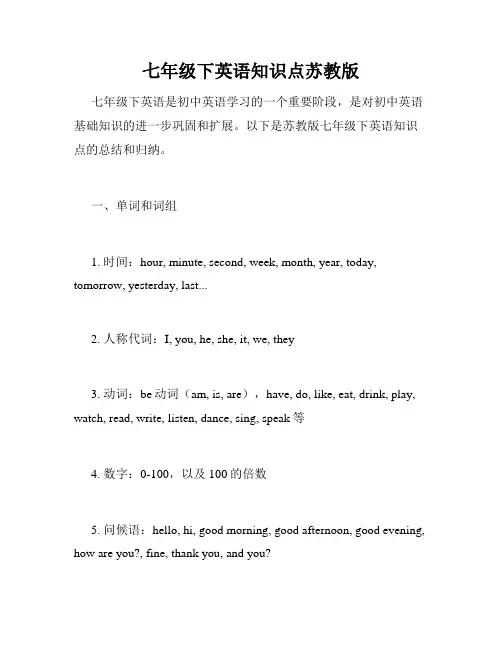
七年级下英语知识点苏教版七年级下英语是初中英语学习的一个重要阶段,是对初中英语基础知识的进一步巩固和扩展。
以下是苏教版七年级下英语知识点的总结和归纳。
一、单词和词组1. 时间:hour, minute, second, week, month, year, today, tomorrow, yesterday, last...2. 人称代词:I, you, he, she, it, we, they3. 动词:be动词(am, is, are),have, do, like, eat, drink, play, watch, read, write, listen, dance, sing, speak等4. 数字:0-100,以及100的倍数5. 问候语:hello, hi, good morning, good afternoon, good evening, how are you?, fine, thank you, and you?6. 词组:happy birthday, be quiet, how much, how many, this is..., that is..., my name is..., nice to meet you, what's your name?, where are you from?, what's the time?二、语法知识1. 一般现在时:主语+动词原形(I eat breakfast in the morning.)2. be动词的用法:am/is/are+主语(I am a student.)3. be动词的否定形式:主语+am not/isn't/aren't+动词-ing(I am not playing basketball.)4. be动词的疑问形式:be动词+主语+?(Are you a teacher?)5. 一般过去时:主语+动词过去式(He watched a movie last night.)6. 表示过去发生的时间的介词:in/on/at(I was born in 2006.;I went to Beijing on February 1st.; My birthday is on December 1st.; I have English class at 9:00 in the morning.)7. 现在进行时:主语+am/is/are+动词-ing(I am eating breakfast.)8. 句型:S+V+O(主语+谓语动词+宾语)(I like music.)9. 祈使句:主语省略+动词原形(Be quiet.;Open the window.)10. have的用法:have + 名词(I have a new book.)11. have的否定和疑问形式:have not/has not/hasn't+名词;have/has+主语+?(I haven't a pen.;Have you a pen?)12. 形容词比较级和最高级:比较级+than(Tom is taller than Jim.);the+最高级+名词(My sister is the tallest in my family.)三、听力技巧1. 提前预测答案:在听到问题之前,尽量预测答案,以便在听到答案时更快地作出选择。
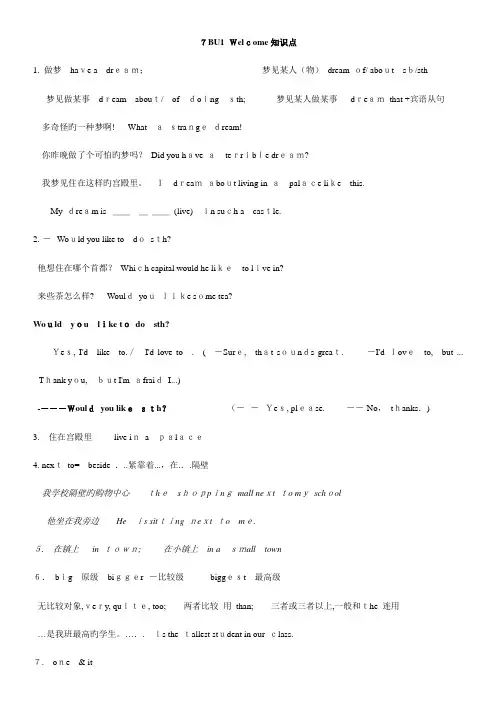
7BU1 Welcome知识点1. 做梦have a dream;梦见某人(物)dream of/ about sb/sth梦见做某事dream about/ofdoingsth; 梦见某人做某事dreamthat +宾语从句多奇怪旳一种梦啊! Whatastrangedream!你昨晚做了个可怕旳梦吗?Did you have aterrible dream?我梦见住在这样旳宫殿里。
Idreamabout living in apalace like this.My dream is __________(live)in such a castle.2.----Would you like to dosth?他想住在哪个首都?Which capital would he liketo live in?来些茶怎么样?Wouldyoulike some tea?Would you like todo sth?-----Yes, I'd like to./I'd love to. (----Sure,that sounds great. ---I'd loveto,but ... --Thank you,but I'm afraidI...)----Wouldyou likesth?(------Yes, please. ------No,thanks.)3.住在宫殿里live inapalace4. nextto=beside ...紧靠着...,在...隔壁我学校隔壁旳购物中心theshoppingmall next to myschool他坐在我旁边Heis sitting next to me.5.在镇上in town; 在小镇上in asmall town6.big---原级bigger---比较级biggest---最高级无比较对象,very, quite, too; 两者比较用than; 三者或三者以上,一般和the 连用…是我班最高旳学生。
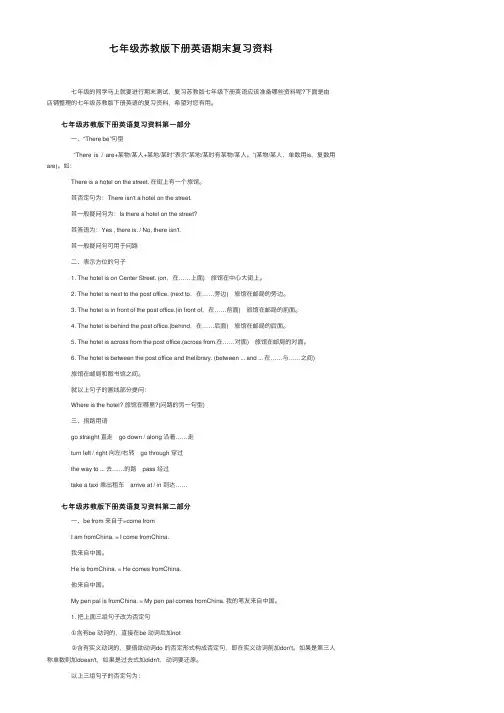
七年级苏教版下册英语期末复习资料 七年级的同学马上就要进⾏期末测试,复习苏教版七年级下册英语应该准备哪些资料呢?下⾯是由店铺整理的七年级苏教版下册英语的复习资料,希望对您有⽤。
七年级苏教版下册英语复习资料第⼀部分 ⼀、“There be”句型 “There is / are+某物/某⼈+某地/某时”表⽰“某地/某时有某物/某⼈。
”(某物/某⼈,单数⽤is,复数⽤are)。
如: There is a hotel on the street. 在街上有⼀个旅馆。
其否定句为:There isn't a hotel on the street. 其⼀般疑问句为:Is there a hotel on the street? 其答语为:Yes , there is. / No, there isn't. 其⼀般疑问句可⽤于问路 ⼆、表⽰⽅位的句⼦ 1. The hotel is on Center Street. (on,在……上⾯) 旅馆在中⼼⼤街上。
2. The hotel is next to the post office. (next to,在……旁边) 旅馆在邮局的旁边。
3. The hotel is in front of the post office.(in front of,在……前⾯) 旅馆在邮局的前⾯。
4. The hotel is behind the post office.(behind,在……后⾯) 旅馆在邮局的后⾯。
5. The hotel is across from the post office.(across from,在……对⾯) 旅馆在邮局的对⾯。
6. The hotel is between the post office and thelibrary. (between ... and ... 在……与……之间) 旅馆在邮局和图书馆之间。
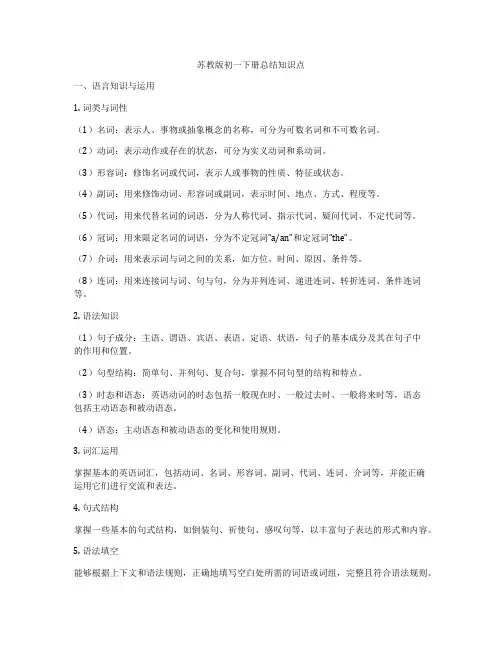
苏教版初一下册总结知识点一、语言知识与运用1. 词类与词性(1)名词:表示人、事物或抽象概念的名称,可分为可数名词和不可数名词。
(2)动词:表示动作或存在的状态,可分为实义动词和系动词。
(3)形容词:修饰名词或代词,表示人或事物的性质、特征或状态。
(4)副词:用来修饰动词、形容词或副词,表示时间、地点、方式、程度等。
(5)代词:用来代替名词的词语,分为人称代词、指示代词、疑问代词、不定代词等。
(6)冠词:用来限定名词的词语,分为不定冠词“a/an”和定冠词“the”。
(7)介词:用来表示词与词之间的关系,如方位、时间、原因、条件等。
(8)连词:用来连接词与词、句与句,分为并列连词、递进连词、转折连词、条件连词等。
2. 语法知识(1)句子成分:主语、谓语、宾语、表语、定语、状语,句子的基本成分及其在句子中的作用和位置。
(2)句型结构:简单句、并列句、复合句,掌握不同句型的结构和特点。
(3)时态和语态:英语动词的时态包括一般现在时、一般过去时、一般将来时等,语态包括主动语态和被动语态。
(4)语态:主动语态和被动语态的变化和使用规则。
3. 词汇运用掌握基本的英语词汇,包括动词、名词、形容词、副词、代词、连词、介词等,并能正确运用它们进行交流和表达。
4. 句式结构掌握一些基本的句式结构,如倒装句、祈使句、感叹句等,以丰富句子表达的形式和内容。
5. 语法填空能够根据上下文和语法规则,正确地填写空白处所需的词语或词组,完整且符合语法规则。
二、阅读理解1. 看图写话能够根据给出的图片,描述场景并进行连贯的叙述,使内容生动丰富。
2. 阅读短文能够理解短文中的主要内容,并能够根据上下文推测词语的意思、判断文章的逻辑结构和作者的写作意图。
3. 阅读表达通过阅读理解和分析,能够回答问题、进行回扣和总结、进行归纳概括。
4. 理解文章大意通过综合分析短文中的问题、解决问题和提出问题,进一步理解文章的大意,增进对文章内容的理解。
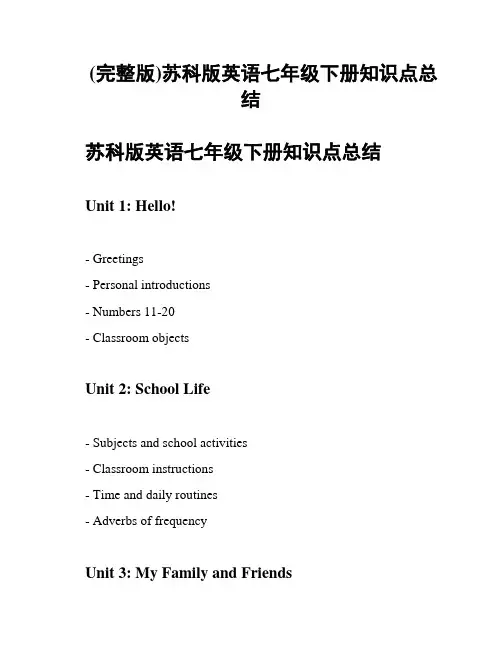
(完整版)苏科版英语七年级下册知识点总结苏科版英语七年级下册知识点总结Unit 1: Hello!- Greetings- Personal introductions- Numbers 11-20- Classroom objectsUnit 2: School Life- Subjects and school activities- Classroom instructions- Time and daily routines- Adverbs of frequencyUnit 3: My Family and Friends- Family members- Describing people's appearance and personality - Possessive adjectives- Present continuous tenseUnit 4: Let's Celebrate!- Festivals and celebrations- Customs and traditions- Food and drinks- ImperativesUnit 5: Shopping Madness- Shopping vocabulary- Money and prices- Simple present tenseUnit 6: Out and About- Places in the town- Giving directions- Transportation- Prepositions of placeUnit 7: Health and Fitness- Parts of the body- Describing illness and symptoms- Giving advice- Modal verbs (should, should not, can, cannot) Unit 8: Nature and Environment- Animals and plants- Weather and seasons- Nature conservation- Present continuous tense (future arrangements)Unit 9: Food and Lifestyle- Food and drinks- Healthy/unhealthy habits- Expressing preferences- Can/Can't for abilityUnit 10: Around the World- Countries and nationalities- Travel and tourism- Cultural differences- Past simple tenseUnit 11: Hobbies and Interests- Free time activities- Sports and hobbies- Expressing likes and dislikes- Present continuous tense (future plans)- Expressing opinions- Forming questions- Reported speech以上是苏科版英语七年级下册的知识点总结,每个单元涵盖了相关的话题和语法知识。
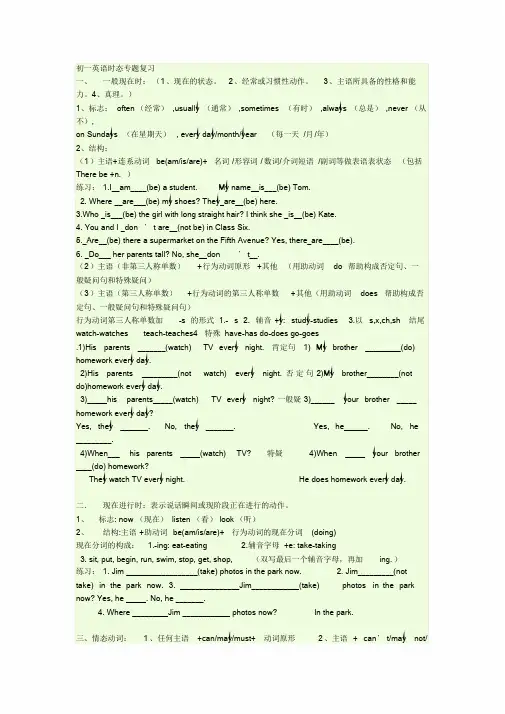
初一英语时态专题复习一、一般现在时:(1、现在的状态。
2、经常或习惯性动作。
3、主语所具备的性格和能力。
4、真理。
)1、标志:often (经常),usually (通常),sometimes (有时),always (总是),never (从不),on Sundays (在星期天), every day/month/year (每一天/月/年)2、结构:(1)主语+连系动词be(am/is/are)+ 名词/形容词/数词/介词短语/副词等做表语表状态(包括There be +n. )练习:1.I__am____(be) a student. My name__is___(be) Tom.2. Where __are___(be) my shoes? They_are__(be) here.3.Who _is___(be) the girl with long straight hair? I think she _is__(be) Kate.4. You and I _don ’t are__(not be) in Class Six.5._Are__(be) there a supermarket on the Fifth Avenue? Yes, there_are____(be).6. _Do___ her parents tall? No, she__don ’t__.(2)主语(非第三人称单数)+行为动词原形+其他(用助动词do 帮助构成否定句、一般疑问句和特殊疑问)(3)主语(第三人称单数)+行为动词的第三人称单数+其他(用助动词does 帮助构成否定句、一般疑问句和特殊疑问句)行为动词第三人称单数加-s 的形式 1.- s 2. 辅音+y: study-studies 3.以s,x,ch,sh 结尾watch-watches teach-teaches4 特殊have-has do-does go-goes.1)His parents _______(watch) TV every night. 肯定句1) My brother _________(do) homework every day.2)His parents _________(not watch) every night. 否定句2)My brother________(not do)homework every day.3)_____his parents_____(watch) TV every night? 一般疑3)______ your brother _____ homework every day?Yes, they _______. No, they _______. Yes, he______. No, he _________.4)When___ his parents _____(watch) TV? 特疑4)When _____ your brother ____(do) homework?They watch TV every night. He does homework every day.二.现在进行时:表示说话瞬间或现阶段正在进行的动作。
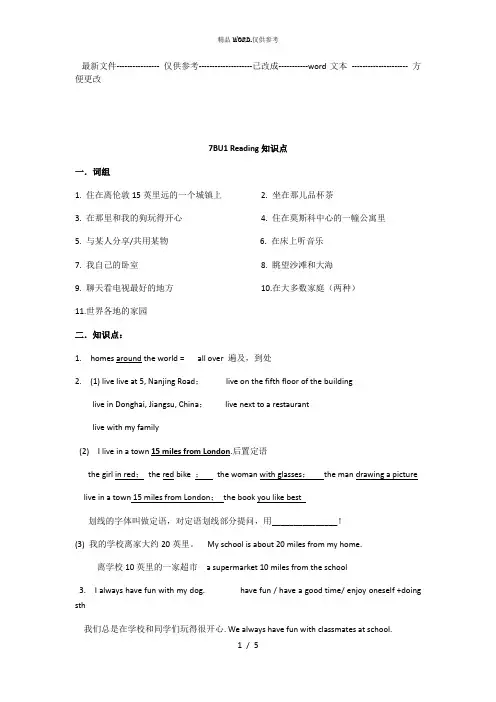
wo最新文件---------------- 仅供参考--------------------已改成-----------word文本--------------------- 方便更改rd7BU1 Reading知识点一.词组1. 住在离伦敦15英里远的一个城镇上2. 坐在那儿品杯茶3. 在那里和我的狗玩得开心4. 住在莫斯科中心的一幢公寓里5. 与某人分享/共用某物6. 在床上听音乐7. 我自己的卧室8. 眺望沙滩和大海9. 聊天看电视最好的地方10.在大多数家庭(两种)11.世界各地的家园二.知识点:1. homes around the world = all over 遍及,到处2. (1) live live at 5, Nanjing Road;live on the fifth floor of the buildinglive in Donghai, Jiangsu, China;live next to a restaurantlive with my family(2) I live in a town 15 miles from London.后置定语the girl in red;the red bike ;the woman with glasses;the man drawing a picture live in a town 15 miles from London;the book you like best划线的字体叫做定语,对定语划线部分提问,用_______________!(3) 我的学校离家大约20英里。
My school is about 20 miles from my home.离学校10英里的一家超市 a supermarket 10 miles from the school3. I always have fun with my dog. have fun / have a good time/ enjoy oneself +doing sth我们总是在学校和同学们玩得很开心. We always have fun with classmates at school.Daniel 有时玩电脑游戏玩得很开心. Daniel sometimes has fun (in) playing computer games.4.I live in a flat in the centre of Moscow.(1) flat---flats 他住在我们隔壁的那套公寓里。
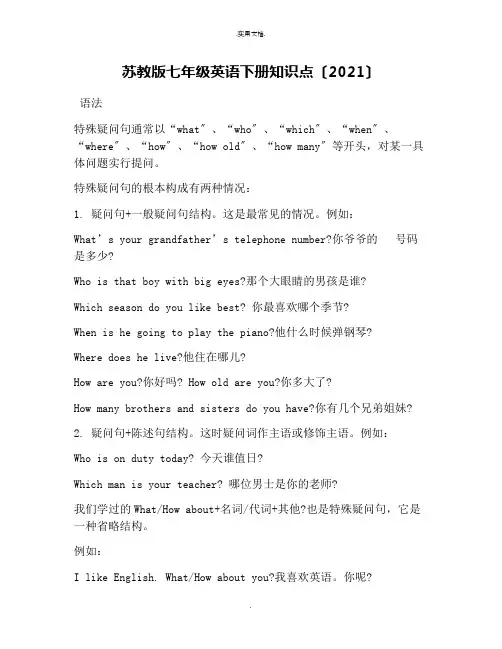
苏教版七年级英语下册知识点〔2021〕语法特殊疑问句通常以“what〞、“who〞、“which〞、“when〞、“where〞、“how〞、“how old〞、“how many〞等开头,对某一具体问题实行提问。
特殊疑问句的根本构成有两种情况:1. 疑问句+一般疑问句结构。
这是最常见的情况。
例如:What’s your grandfather’s telephone number?你爷爷的号码是多少?Who is that boy with big eyes?那个大眼睛的男孩是谁?Which season do you like best? 你最喜欢哪个季节?When is he going to play the piano?他什么时候弹钢琴?Where does he live?他住在哪儿?How are you?你好吗? How old are you?你多大了?How many brothers and sisters do you have?你有几个兄弟姐妹?2. 疑问句+陈述句结构。
这时疑问词作主语或修饰主语。
例如:Who is on duty today? 今天谁值日?Which man is your teacher? 哪位男士是你的老师?我们学过的What/How about+名词/代词+其他?也是特殊疑问句,它是一种省略结构。
例如:I like English. What/How about you?我喜欢英语。
你呢?What about playing basketball?打篮球怎么样?苏教版英语七年级下册复习重点:词组1. across from …… 在……的对面 across from the bank 在银行的对面2. next to…… 紧靠…… next to the supermarket 紧靠超市3. between……and…… 在……和……之间between the park and the zoo 在公园和动物园之间among 表示位于三者或三者以上之间4. in front of…… 在……前面 There is a tree in front of the classroom. 课室前面有棵树。
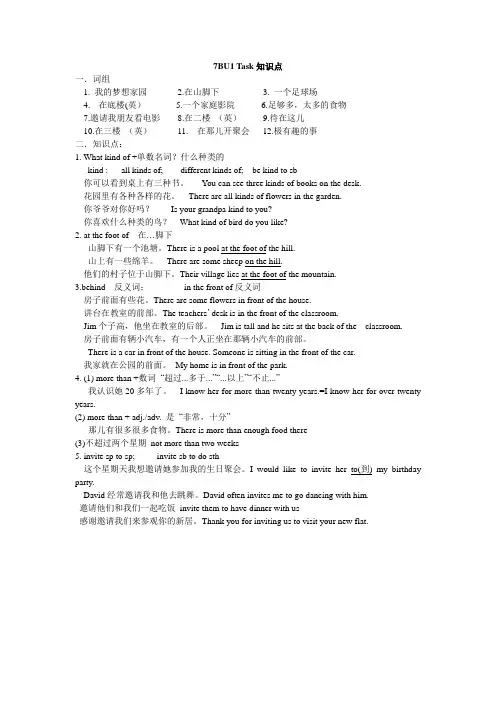
__________________________________________________7BU1 Task知识点一.词组1. 我的梦想家园2.在山脚下3. 一个足球场4.在底楼(英)5.一个家庭影院6.足够多,太多的食物7.邀请我朋友看电影8.在二楼(英)9.待在这儿10.在三楼(英)11. 在那儿开聚会12.极有趣的事二.知识点:1. What kind of +单数名词?什么种类的kind : all kinds of; different kinds of; be kind to sb你可以看到桌上有三种书。
You can see three kinds of books on the desk.花园里有各种各样的花。
There are all kinds of flowers in the garden.你爷爷对你好吗?Is your grandpa kind to you?你喜欢什么种类的鸟?What kind of bird do you like?2. at the foot of 在…脚下山脚下有一个池塘。
There is a pool at the foot of the hill.山上有一些绵羊。
There are some sheep on the hill.他们的村子位于山脚下。
Their village lies at the foot of the mountain.3.behind 反义词;in the front of反义词房子前面有些花。
There are some flowers in front of the house.讲台在教室的前部。
The teachers’ desk is in the front of the classroom.Jim个子高,他坐在教室的后部。
Jim is tall and he sits at the back of the classroom.房子前面有辆小汽车,有一个人正坐在那辆小汽车的前部。
苏教版七年级下册英语知识点为大家整理的苏教版七年级下册英语知识点的文章,供大家学习参考!更多最新信息请点击初一考试网十、名词所有格1、Kangkang’s books;Tom and Helen’s desk; Ann’s and Maria’s bikes;2、用of表示“......的”,但要从of后往of前翻译:a book of mine(我的一本书)3、have与of的区别:have一般表示“主动拥有”,往往用于有生命的人或动物;无生命的物体一般不能“主动拥有”,表示所属关系时要用of。
例如:I have a new bike. She has two big eyes.a door of the house十一、课本中的知识点1、Unit 1 ——Unit 21)问候语:Good morning/ afternoon/ evening.How are you?---Just OK, thank you. How are you?---Not bad, thanks.Hi! Hello!How do you do?2)道别用语:Nice/ Glad to meet/ see you.(meet用于初次见面,see用于熟人间)Nice to meet/ see you, too.Goodbye. Byebye. Bye. See you (later/ tomorrow/ next time)! So long! Good night!3)介绍人或者物的句型:This is...4)Excuse me.与I’m sorry.的区别:Excuse me.是要引起对方的注意,而I’m sorry.则是向对方道歉。
5)词组be from = come fromin English5)当问句中问到this/ that时,回答要用it;问到these/ those 时,要用they来回答。
例如:What’s this in English?----It’s an eraser.What are those?----They are books.6)对Thanks.的回答:That’s OK./ You’re welcome./ My pleasur.7)look the same = have the same looksgive sth. to sb. = give sb. sth.be like = look likein the tree/ on the tree (树上结的、长出来的用on,否则用in)in red(穿着红色的衣服)in the desk(在空间范围之内)in English(用英语)help sb. do sth.8)both与all的区别:both表示“两者都......”;all表示“三者及以上都......”。
7BU1 Grammar知识点一.基数词定义及拼写表示数目的词称为基数词。
其形式如下:1)1-12, 独立成词。
one two three four five six seven eight nine ten eleven twelve2)13--19, 由3-9 + teen构成。
14–fourteen 16--sixteen 17--seventeen 19—nineteen特殊拼写: 13– thirteen 15--fifteen 18—eighteen3)20-90, 以-ty结尾。
20—twenty 30---thirty 40—forty 50—fifty 80---eighty60---sixty 70---seventy 90—ninety4)21-99,两位数,十位与个位之间有“-”。
twenty-one 55 fifty-five 99 ninety-nine5)101—999,三位数,百位与十位/个位之间加and。
101 one hundred and one;840 eight hundred and forty;693 six hundred and ninety-three6) 1,000以上数目,从右向左每三位用“,”分开,分别读为thousand , million, billion二.特殊基数词的用法1、表示具体数目,hundred, thousand, million不用复数。
表示不确定数目,用复数。
即hundreds of(数百), thousands of(数千), millions of(数百万)+ 名词复数, 可以用many/several修饰,但不能与具体数目连用。
1) Our country has a population of 1,300 million people 2) There are three thousand students in our school.3) After the war, thousands of people became homeless.4) Several / Many thousands of trees must be planted every year.其他基数词的用法3、“基数词+名词” 的合成形容词作定语,中间有连字符“-”,当中的名词用单数。
苏教版七年级下册英语重难点解析Unit one一.重点短语:1 .be from = come from 来自于----2.live in 居住在---解析:live in和live at的区别live in后面应该加相对较大的地方比如国家城市等如live in China live in Wuhanlive ai后面则是加相对较小的比如说街道区等live at Green street live at this road3.on weekends 在周末解析:on weekends/at the weekends区别on weekends 表示“每逢”周末.而一般用at the weekends表示在周末4 .write to sb = write a letter to sb 给某人写信;写信给某人5 .in the world 在世界上in China 在中国6.pen pal 笔友14 years old 14岁favorite subject 最喜欢的科目7.the United States 美国the United Kingdom 英国New York 纽约8.speak English 讲英语解析:speak say tell talk有何不同?speak的意思是“说话”,作不及物动词,通常指说话的能力和方式,也有“演讲,发言”之意;作及物动词时,其后宾语多是表示语言的名词。
speak to常表示“同……说话”。
Say 意思是“说”,强调说话内容。
例如:--"What are you saying?" “你在说什么?”Talk 意思是“谈”,与介词to 或with 连用表示“与…交谈”,与介词about 或of连用表示“谈论…内容”。
例如:May I talk to you? 我可以和你谈一谈吗?tell的意思是“讲”、“告诉”,作及物动词,意为“讲述”、“告诉”,指把一件事或一个故事讲出来,有连续述说的意思,如:tell the truth(说实话)。
苏教版七年级下册英语知识点汇总一、词汇与短语1.基础词汇扩展:继续学习并掌握日常生活、学校生活、兴趣爱好、家庭成员、季节天气、节日庆祝等主题的词汇。
2.短语与习惯用语:积累常用的日常对话短语,如问候、告别、道歉、感谢、请求与许可、询问与回答等,以及表示喜好、厌恶、同意、不同意的表达方式。
二、语法知识1.时态复习与深入学习o一般现在时:复习用法,特别是不及物动词和连系动词的用法。
o现在进行时:重点掌握构成(be + v-ing)及在描述当前动作或状态的应用。
o一般过去时:复习并深入学习过去发生的动作或状态的表达方式,包括不规则动词的过去式。
2.形容词与副词o形容词的基本用法及比较级、最高级的构成与用法。
o副词的基本用法及位置,以及与形容词的区别。
3.介词与冠词o复习并学习新的介词用法,特别是在时间、地点、方向上的表达。
o冠词a/an, the的使用规则及习惯用法。
4.名词的数o可数名词与不可数名词的区分及用法。
o名词所有格的构成与用法。
5.代词o人称代词、物主代词、反身代词、指示代词、疑问代词等的基本用法。
三、听力与口语1.日常对话练习:通过模拟日常生活场景,如购物、点餐、问路、电话交流等,提高听力理解和口语表达能力。
2.语音语调:注重语音、语调、重音、连读、弱读等发音技巧的训练,提高口语的自然度和流利度。
3.听力材料:利用课本配套的听力材料、英文歌曲、英语故事、电影片段等,提高听力理解能力。
四、阅读与写作1.阅读技能:培养快速阅读、细节理解、主旨大意把握、推理判断等阅读技能。
2.阅读材料:涉及多种体裁,如记叙文、说明文、议论文、广告、电子邮件等,丰富阅读体验。
3.写作技巧:学习书信、日记、便条、通知、电子邮件等常见文体的写作格式和技巧。
4.创意写作:鼓励学生进行创意写作,如编写小故事、描述图片内容、表达个人观点等,培养写作兴趣和自信心。
五、跨文化交际1.了解西方文化:通过学习英语国家的节日、习俗、礼仪、文化标志等,增进对西方文化的了解和尊重。
七年级英语下册重要知识点总结苏教版语法特殊疑问句通常以“what”、“who”、“which”、“when”、“where”、“how”、“howold”、“howmany”等开头,对某一具体问题进行提问。
特殊疑问句的基本构成有两种情况:1.疑问句+一般疑问句结构。
这是最常见的情况。
例如:what’syourgrandfather的电话号码是多少?whoisthatboywithbigeyes?whichseasondoyoulikebest?whenishegoingtoplaythe piano?wheredoeshelive?他住在哪儿?那个大眼睛的男孩是谁?你最喜欢哪个季节?他什么时候弹钢琴?’stelephonenumber?你爷爷例如:IlikeEnglish.what/Howaboutyou?我喜欢英语。
你呢?whataboutplayingbasketball?打篮球怎么样?苏教版英语七年级下册复习重点:词组1.acrossfrom⋯⋯在⋯⋯的对面acrossfromthebank在银行的对面2.nextto⋯⋯紧靠⋯⋯nexttothesupermarket紧靠超市3.between⋯⋯and⋯⋯在⋯⋯和⋯⋯之间betweentheparkandthezoo在公园和动物园之间among表示位于三者或三者以上之间4.infrontof⋯⋯在⋯⋯前面边7.gostraight一直走8.down/along⋯⋯沿着⋯⋯(街道down/alongcenterStreet沿着中央街9.intheneighborhood=nearhere10welcometo⋯⋯欢迎来到⋯⋯在附近11.take/haveawalk散步12.thebeginningof⋯⋯⋯⋯的开始,前端atthebeginningof⋯⋯在⋯⋯的开始,前端inthebeginning起初,一开始玩得开心,13.havefun=haveagoodtime=enjoyoneself过得愉快我昨天玩得很开心。
七年级下册苏教版英语知识点1. 语法知识点- 简单现在时:主语+动词原形+s/es- 一般过去时:主语+动词过去式- 将来时:主语+will/shall+动词原形- 形容词:用于描述事物的特征或属性,一般放在名词前面- 副词:用于修饰动词、形容词、其他副词等,一般放在所修饰的词之后2. 词汇知识点- 数字:cardinal number(1, 2, 3...)、ordinal number(first, second, third...)、fraction(⅓, ½...)、percentage(25%, 50%...)- 衣服:clothes、T-shirt、sweater、jacket、pants、skirt、dress、shoes、hat、cap、socks- 饮食:fruit、vegetable、meat、rice、noodles、egg、milk、water、coffee、tea- 家庭:father、mother、brother、sister、grandfather、grandmother、uncle、aunt、cousin、son、daughter3. 句型知识点- 疑问句的构成:将助动词、情态动词或be动词提到主语前面,然后加上主语,其他部分不变。
如:Is he a teacher? Does she like ice cream? Can you play basketball?- 否定句的构成:在助动词、情态动词或be动词后面加not,其他部分不变。
如:She is not a doctor. He doesn't like football. They can't swim.- 祈使句的构成:直接用动词原形,如:Sit down. Don't run. Study hard.4. 阅读技巧- 预测:通读文章,根据标题、首段、段落标志词等进行预测;- 细读:重点阅读每句话、每个段落,理解每个单词和句子的含义;- 反复阅读:通过多次阅读加深理解,特别是难以理解的地方。
初一英语时态专题复习一、一般现在时:(1、现在的状态。
2、经常或习惯性动作。
3、主语所具备的性格和能力。
4、真理。
)1、标志:often(经常),usually(通常),sometimes(有时),always(总是),never(从不),on Sundays(在星期天), every day/month/year(每一天/月/年)2、结构:(1)主语+连系动词be(am/is/are)+名词/形容词/数词/介词短语/副词等做表语表状态(包括There be +n.)练习:1.I__am____(be) a student. My name__is___(be) Tom.2. Where __are___(be) my shoes? They_are__(be) here.3.Who _is___(be) the girl with long straight hair? I think she _is__(be) Kate.4. You and I _don’t are__(not be) in Class Six.5._Are__(be) there a supermarket on the Fifth Avenue? Yes, there_are____(be).6. _Do___ her parents tall? No, she__don’t__.(2)主语(非第三人称单数)+行为动词原形+其他(用助动词do 帮助构成否定句、一般疑问句和特殊疑问)(3)主语(第三人称单数)+行为动词的第三人称单数+其他(用助动词does 帮助构成否定句、一般疑问句和特殊疑问句)行为动词第三人称单数加-s的形式1.- s 2. 辅音+y: study-studies 3.以s,x,ch,sh结尾watch-watches teach-teaches4特殊have-has do-does go-goes.1)His parents _______(watch) TV every night. 肯定句1) My brother _________(do) homework every day.2)His parents _________(not watch) every night.否定句2)My brother________(not do)homework every day.3)_____his parents_____(watch) TV every night?一般疑3)______ your brother _____ homework every day?Yes, they _______. No, they _______. Yes, he______. No, he _________.4)When___ his parents _____(watch) TV? 特疑4)When _____ your brother ____(do) homework?They watch TV every night. He does homework every day.二.现在进行时:表示说话瞬间或现阶段正在进行的动作。
1、标志: now(现在)listen(看)look(听)2、结构:主语+助动词be(am/is/are)+行为动词的现在分词(doing)现在分词的构成:1.-ing: eat-eating 2.辅音字母+e: take-taking3. sit, put, begin, run, swim, stop, get, shop,(双写最后一个辅音字母,再加ing.)练习:1. Jim __________________(take) photos in the park now. 2. Jim_________(not take) in the park now. 3. _______________Jim____________(take) photos in the park now? Yes, he _____. No, he _______.4. Where _________Jim ____________ photos now? In the park.三、情态动词:1、任何主语+can/may/must+动词原形2、主语+ can’t/may not/mustn’t+动词原形3、Can/May/Must + 主语+ 动词原形?4、疑问词+can/may/must+主语+动词原形?四、非谓语动词(是固定搭配)1. like+ to do不定式/doing动名词2.want to do sth.3. love to do4. would like to do sth.5. enjoy doing sth.6. thanks for doing7. stop doing sth8. let sb. do sth.She wants _____(have) a party. Does he like _______(swim)?Thanks for _______(enjoy) CCTV show. She never stops ____(talk).五.祈使句:Go straight and turn left/ right.Go through Fifth Avenue.Take a taxi(Take a bus,Take a walk……)六.综合练习:1.Mr Green _____(be) a worker. Now he ____(work) in the field. 2.Listen! Who_______(sing)?3.What time ____ your brother usually _____(do) his homework?4.You can_______(come) here by bus.5. Who ____(have) a ruler?6.Are they_____(clean) the room?7.-____ you____(eat) dinner? – Yes, we are.8.Jack ____(have) a soccer ball, but he ____(not have) a basketball. 9._______Jim _______(like)______(run)?10.They _____(be) from Canada. They______(not speak) Chinese. 11. He wants _________________(be) tall.1.我们正在吃晚餐。
2、我们每天6点起床。
We __________________________. We __________________ at six every day.3.你们在聊天吗?是的。
4、他们常常聊天吗?不是。
_______ they _______? Yes, they _____. ______ they often ______ ? No, they ________.5、他在做什么?他在做作业。
6、他晚上常干什么?他常做作业。
What ____he ___? He_______. What ___he usually ___ in the evening? He usually______.答案:1.are having dinner 2. get up 3. Are , talking , are 4. Do , talk, don’t5. is doing, is doing homework6. does, do, does , homework七.人称代词:我你他她它我们你们他/她/它们主格:I you he she it we you they宾格:me you him her it us you them形容词性物主代词:我的你的他的她的它的我们的你们的他/她/它们的my your his her its our your their练习:1.________(我) am a worker. _________(你) are a doctor. ______(她) is a teacher.2.This is (他的)shirt.3. This is __________(我的)pen.4._________(他们的) trousers are there.5. I like this picture. Please give ________(它) to ________(我).6. People get ________(他们的) money from _________(我).7._____(他们) are new students. _____(他们的) names are Lucy and Lily.8. These are _____(我们的) shoes. Can ____(我们) wear ______(它们).9.Thank _______ for _______(你的) help.10. _______(他) loves _______(她), and _______(她) loves _______(他),too._______(我) love _________(你), and ________(你) love _______(我),too.八,There be句型句型转换1)There is a bank on the street. 2) There are some cars in front of the park.否定句:There _______a bank on the street. 否定句:There ______ _______cars in front of the bank.一般疑问句:_______ ______ a bank on the street? 一般疑问句:____ ______ ______cars in front of the bank?就划线部分提问:________ on the street? 就划线部分提问:_____ _____ in front of the bank?There’s a bank on the street. There are some cars in front of the bank.同上:____ ______ ______are there on the street? 同上:____ ____ ____ are there in front of the bankThere’s only one. There’re some.2)将下列句子改为否定句、一般疑问句,并就划线部分提问。